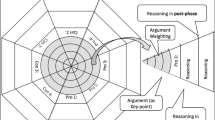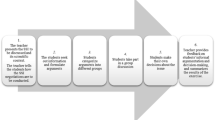Abstract
The present study analyses the impact of negotiation processes on activating argumentative resources for decision-making in a socioscientific issue (SSI) in biology classes. The research focuses on the potential of group-based negotiation processes to activate the use of relevant argumentative resources without any prescribed or explicit instructions on these resources and arguments. In the corresponding intervention with a pre-post-design, students are encouraged to reason and weight their own arguments, which are based on protecting local biodiversity. The students have to reason and weight individually (pre-phase) immediately before they discuss their own reasoning and weighting with others in groups (treatment). The students have to then, once again, reason and weight their arguments individually (post-phase). The students are instructed, during these three steps (pre-phase, treatment, post-phase), using an educational tool, target-mat, which structures the reasoning and weighting visually, but does not prescribe the way of argumentation. By analysing the students’ argumentative resources, normative and fact-based elements can be measured immediately before and after the negotiation process. In terms of the pre-phase, the use of differing and appropriate argumentative resources can be analysed in relation to different arguments. The pre- and post-comparison reveals relevant changes leading to a substantial increase of the quality of reasoning. Therefore, in a student-centred decision-making process with minimal guidance, students are encouraged to become aware of the appropriateness of different argumentative resources.





Similar content being viewed by others
Notes
Affect is defined as a human emotional state (e.g. happiness, sadness) or the degree of value that people associate with a stimulus (e.g. goodness, badness) (Arvai et al. 2004).
References
Abd-El-Khalik, F. (2003). Socioscientific issues in pre-college science classrooms. In D. L. Zeidler (Hrsg.), The Role of Moral Reasoning on Socioscientific Issues and Discourse in Science Education (pp. 41-61). Springer: Netherlands.
Acar, O., Turkmen, L., & Roychoudhury, A. (2010). Student difficulties in socio-scientific argumentation and decision-making research findings: crossing the borders of two research lines. International Journal of Science Education, 32(9), 1191–1206.
Åkerblom, D., & Lindahl, M. (2017). Authenticity and the relevance of discourse and figured worlds in secondary students’ discussions of socioscientific issues. Teaching and Teacher Education, 65, 205–214.
Andrews, R. (2005). Models of argumentation in educational discourse. Text - Interdisciplinary Journal for the Study of Discourse, 25(1), 107–127.
Arvai, J. L., Campbell, V. E. A., Baird, A., & Rivers, L. (2004). Teaching students to make better decisions about the environment: lessons from the decision sciences. The Journal of Environmental Education, 36(1), 33–44.
Arvai, J. L., & Gregory, R. (2003). A decision focused approach for identifying cleanup priorities at contaminated sites. Environmental Science & Technology, 37, 1469–1476.
Bartels, D. M., Bauman, C. W., Cushman, F. A., Pizarro, D. A., & McGraw, A. P. (2015). Moral judgment and decision making. In G. Keren & G. Wu (Eds.), The Wiley Blackwell Handbook of Judgment and Decision Making. Chichester, UK: Wiley.
Bicchieri, C., Muldoon, R. and Sontuoso, A., (2018)"Social Norms", The Stanford encyclopedia of philosophy (Winter 2018 Edition), Edward N. Zalta (ed.), URL = <https://plato.stanford.edu/archives/win2018/entries/social-norms/>. Accessed 05 February 2019
Billig, M. (1996). Arguing and thinking: a rhetorical approach to social psychology. Cambridge University Press.
Bohnenblust, H., & Slovic, P. (1998). Integrating technical analysis and public values in risk-based decision making. Reliability Engineering & System Safety, 59(1), 151–159.
Bögeholz, S., Hößle, C., Langlet, J., Sander, E., & Schlüter, K. (2004). Bewerten – Urteilen – Entscheiden im biologischen Kontext: Modelle in der Biologiedidaktik (Evaluate - Judge - Decide in the biological context: Models in Biology Didactics). Zeitschrift für Didaktik der Naturwissenschaften, 10, 89–115.
Böttcher, F., Hackmann, A., & Meisert, A. (2016). “Argumente entwickeln, prüfen und gewichten”. Bewertungskompetenz im Biologieunterricht kontextübergreifend fördern - Konzeptentwicklung ("developing, justifying and weighting arguments". Promoting decision-making competence in biology classes in all contexts - concept development). MNU Journal, 69(3), 150–157.
Böttcher, F., & Meisert, A. (2013). Effects of direct and indirect instruction on fostering decision-making competence in socioscientific issues., 43(2), 479–506.
Byrne, J., Ideland, M., Malmberg, C., & Grace, M. (2014). Climate change and everyday life: Repertoires children use to negotiate a socio-scientific issue. International Journal of Science Education, 36(9), 1491–1509.
Dawson, V., & Carson, K. (2018). Introducing argumentation about climate change socioscientific issues in a disadvantaged school. Research in Science Education, 1–21.
Driver, R., Newton, P., & Osborne, J. (2000). Establishing the norms of scientific argumentation in classrooms. Science Education, 84(3), 287–312.
Chung, Y., Yoo, J., Kim, S.-W., Lee, H., & Zeidler, D. L. (2016). Enhancing students’ communication skills in the science classroom through socioscientific issues. International Journal of Science and Mathematics Education, 14(1), 1–27.
Eggert, S., & Bögeholz, S. (2006). Göttinger Modell der Bewertungskompetenz–Teilkompetenz, Bewerten, Entscheiden und Reflektieren für Gestaltungsaufgaben Nachhaltiger Entwicklung Göttingen model of the evaluation competence partial competence “assessment, decision-making and reflection” for tasks of sustainable development. Zeitschrift für Didaktik der Naturwissenschaften, 12, 177–199.
Erduran, S., Simon, S., & Osborne, J. (2004). TAPping into argumentation: developments in the application of Toulmin’s argument pattern for studying science discourse. Science Education, 88(6), 915–933.
Goldstein, M., Crowell, A., & Kuhn, D. (2009). What constitutes skilled argumentation and how does it develop? Informal Logic, 29(4), 379–395.
Goodwin, J. (2001). Henry Johnstone, Jr.’s still-unacknowledged contributions to contemporary argumentation theory. Informal Logic, 21(1), 41–50.
Grace, M. (2009). Developing high quality decision-making discussions about biological conservation in a normal classroom setting. International Journal of Science Education, 31(4), 551–570.
Habermas, J. (1984). The theory of communicative action: Vol. 1, reason and the rationalization of society (T. McCarthy, trans.). London: Heinemann.
Haidt, J. (2001). The emotinal dog and ist rational tail: A social intuitionist approach to moral judgment. Psychological Review, 108(4), 814–834.
Heimlich, J. E. (1992). Promoting a concern for the environment. Lanham, MD: Educational Resources Information Hodson, D. (2009). Teaching and Learning about Science: Language, Theories, Methods, History, Traditions and Values. Rotterdam: Sense Publishers.
Hostenbach, J., Fischer, H. E., Kauertz, A., Mayer, J., Sumfleth, E., & Walpuski, M. (2011). Modellierung der Bewertungskompetenz in den Naturwissenschaften zur evaluation der Nationalen Bildungsstandards (modeling decision-making competence in science for the evaluation of national educational standards). Zeitschrift für Didaktik der Naturwissenschaften: ZfDN, 17, 261–288.
Hodson, D. (2009). Teaching and Learning about Science: Language, Theories, Methods, History, Traditions and Values. Rotterdam: Sense Publishers.
Hungerford, H. R., & Volk, T. L. (1990). Changing learner behavior through environmental education. The Journal of Environmental Education, 21(3), 8–21.
Jiménez-Aleixandre, M. P. (2007). Designing argumentation learning environments. In Argumentation in science education (pp. 91–115). Dordrecht: Springer.
Kolstø, S. D. (2001). Scientific literacy for citizenship: tools for dealing with the science dimension of controversial socioscientific issues. Science Education, 85(3), 291–310.
Kuhn, D. (2018). A role for reasoning in a dialogic approach to critical thinking. Topoi, 37(1), 121–128.
Kuhn, D., & Crowell, A. (2011). Dialogic argumentation as a vehicle for developing young adolescents’ thinking. Psychological Science, 22(4), 545–552.
Kuhn, D., Shaw, V., & Felton, M. (1997). Effects of dyadic interaction on argumentive reasoning. Cognition and Instruction, 15(3), 287–315.
Kuhn, D., & Udell, W. (2003). The development of argument skills. Child Development, 74(5), 1245–1260.
Marks, R., & Eilks, I. (2009). Promoting scientific literacy using a socio-critical and problem-oriented approach to chemistry teaching: concept, examples, experiences. International Journal of Science and Environmental Education, 4, 131–145.
Mayring, P. (2010). Qualitative Inhaltsanalyse Grundlagen und Techniken. (qualitative content analysis. Principles and techniques). Weinheim: Beltz Deutscher Studien Verlag.
McShane, T. O., Hirsch, P. D., Trung, T. C., Songorwa, A. N., Kinzig, A., Monteferri, B., Mutekanga, D., Thang, H. V., Dammert, J. L., Pulgar-Vidal, M., Welch-Devine, M., Peter Brosius, J., Coppolillo, P., & O’Connor, S. (2011). Hard choices: Making trade-offs between biodiversity conservation and human well-being. Biological Conservation, 144(3), 966–972.
Means, M. L., & Voss, J. F. (1996). Who reasons well? Two studies of informal reasoning among children of different grade, ability, and knowledge levels. Cognition and Instruction, 14, 139–178.
Meisert, A. (2013). Bewerten. (decision-making). In U. Spörhase (Ed.), Biologiedidaktik. Praxishandbuch für die Sekundarstufe I und II (pp. 225–240). Berlin: Cornelsen.
Meisert, A. (2018). Mit der Zielmat bewerten (use a target mat to evaluate). In U. Spörhase & W. Ruppert (Eds.), Biologie Methodik (pp. 236–240). Berlin: Cornelsen.
Mercier, H., Boudry, M., Paglieri, F., & Trouche, E. (2017). Natural-born arguers: teaching how to make the best of our reasoning abilities. Educational Psychologist, 52(1), 1–16.
Mercier, H., & Sperber, D. (2011). Why do humans reason? Arguments for an argumentative theory. Behavioral and Brain Sciences, 34(2), 57–74.
National Research Council. (2012). A framework for K-12 science education: practices, crosscutting concepts, and core ideas. National Academies Press.
Newton, P., Driver, R., & Osborne, J. (1999). The place of argumentation in the pedagogy of school science. International Journal of Science Education, 21(5), 553–576.
Nielsen, J. A. (2013). Dialectical features of students’ argumentation: a critical review of argumentation studies in science education. Research in Science Education, 43(1), 371–393.
Osborne, J., Erduran, S., & Simon, S. (2004). Enhancing the quality of argumentation in school science. Journal of Research in Science Teaching, 41(10), 994–1020.
Ratner, B. (2004). “Sustainability” as a dialogue of values: challenges to the sociology of development. Sociological Inquiry, 74, 50–69.
Rockström, J., Steffen, W., Noone, K., Persson, Å., Chapin, F. S., Lambin, E. F., et al. (2009). A safe operating space for humanity. Nature, 461(7263), 472–475.
Sadler, T. D. (2004). Informal reasoning regarding socio-scientific issues: a critical review of research. Journal of Research in Science Teaching, 41(5), 513–536.
Sadler, T. D., & Zeidler, D. L. (2005). Patterns of informal reasoning in the context of socioscientific decision making. Journal of Research in Science Teaching, 42(1), 112–138.
Seethaler, S., & Linn, M. (2004). Genetically modified food in perspective: an inquiry-based curriculum to help middle school students make sense of tradeoffs. International Journal of Science Education, 26(14), 1765–1785.
Simon, S. (2008). Using Toulmin’s argument pattern in the evaluation of argumentation in school science. International Journal of Research & Method in Education, 31(3), 277–289.
Smith, P. C. (1995). Towards a discursive logic: Gadamer and Toulmin on inquiry and argument. In L. K. Schmidt (Ed.), The specter of relativsm (pp. 159–177). Evanston: Northwestern University Press.
Stern, P. C., Dietz, T., & Black, J. S. (1985). Support for environmental protection: the role of moral norms. Population and Environment, 8(3–4), 204–222.
Toulmin, S. (2003). The Uses of Argument. 1958. Cambridge: Cambridge UP.
Witzig, S. B., et al. (2013). The interface of opinion, understanding and evaluation while learning about a socioscientific issue. International Journal of Science Education, 35(15), 2483–2507.
Zeidler, D. L. (1997). The central role of fallacious thinking in science education. Science Education, 81, 483–496.
Zeidler, D. L., & Sadler, T. D. (2007). The role of moral reasoning in argumentation: conscience, character, and care. In S. Erduran & M. P. Jiménez-Aleixandre (Eds.), Argumentation in Science Education (pp. 201–216). Netherlands: Springer.
Zeidler, D. (2015). Socioscientific issues. In R. Gunstone (ed.), Encyclopedia of Science Education (pp. 998–1003). Springer Netherlands.
Zohar, A., & Nemet, F. (2002). Fostering students’ knowledge and argumentation skills through dilemmas in human genetics. Journal of Research in Science Teaching, 39, 35–62.
Acknowledgements
I would like to thank the working group Biology Didactics of the University of Hildesheim for the numerous discussions and suggestions.
Author information
Authors and Affiliations
Corresponding author
Additional information
Publisher’s Note
Springer Nature remains neutral with regard to jurisdictional claims in published maps and institutional affiliations.
Rights and permissions
About this article
Cite this article
Jafari, M., Meisert, A. Activating Students’ Argumentative Resources on Socioscientific Issues by Indirectly Instructed Reasoning and Negotiation Processes. Res Sci Educ 51 (Suppl 2), 913–934 (2021). https://doi.org/10.1007/s11165-019-09869-x
Published:
Issue Date:
DOI: https://doi.org/10.1007/s11165-019-09869-x




